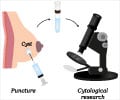A new study conducted by researchers at Georgetown University Medical Center (GUMC) has found that breast cancer cells that don't respond to tamoxifen may be producing high amounts
A new study conducted by researchers at Georgetown University Medical Center (GUMC) has found that breast cancer cells that don't respond to tamoxifen may be producing high amounts of cholesterol in order to provide a kind of shield against the drug.
The findings suggest that widely available statin drugs, which reduce cholesterol levels, may be useful for patients with tamoxifen-resistant breast cancer.Alternatively new agents could be designed to inhibit the excess production of cholesterol by breast cancer cells, say the researchers.
"We have shown that if you inhibit the activity of either of two molecules that we identified in these resistant breast cancer cells, cholesterol production is reduced," said the study's lead author, Rebecca Riggins, PhD, a research assistant professor of oncology at GUMC's Lombardi Comprehensive Cancer Center in Washington.
"We are now looking at whether these cells become re-sensitized once more to tamoxifen when cholesterol production is blocked, and our bet is that they do," she added.
During the study, the researchers were trying to understand why some women with estrogen receptor-positive (ER+) invasive lobular breast cancer do not benefit as much from hormonal therapy such as tamoxifen when compared to women with other forms of ER+ breast cancer.
They have concluded that cholesterol production inside these cancer cells is one culprit.
Advertisement
"One is that cholesterol is an essential part of the plasma membrane that surrounds all eukaryotic cells. A high level of cholesterol can make this membrane more rigid, impairing the ability of drugs to enter cells and thus altering how sensitive a cancer cell is to this type of drug treatment," she said.
Advertisement
"High levels of mitochondrial cholesterol can delay or block cell death. This is important because many cancer drugs, including tamoxifen, have been shown to induce breast cancer cell death through the mitochondria," she added.
The study has been presented at the Annual Meeting of the American Association for Cancer Research (AACR).
Source-ANI
SRM















